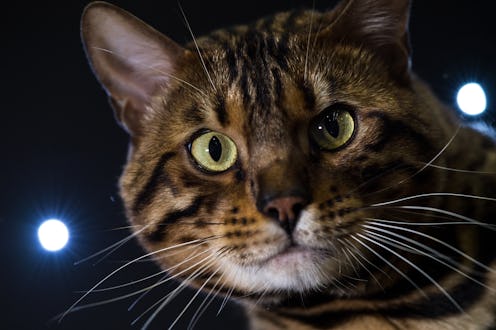Life
7 Things That Are Toxic To Cats That You Probably Have At Home Right Now

Felines are wonderful creatures to have around the house — but they also have a habit of eating and licking things that do not belong to them. My own cat has decided that the elephant foot plant in our living room is her personal snack; luckily, we checked before buying that it's non-toxic for cats, or else we'd be in trouble. But there are many things that are toxic to cats lurking around your house, and some aren't obvious unless you do a bit of research.
Having a pet is much like having a kid: you have to check the contents of everything, because they will get everywhere and eat everything they're not supposed to. Cats don't confine themselves to the cat food and toys that have been created specifically for them; I've heard stories of cats who've eaten everything from the Sunday roast to an entire packet of biscuits (at the bottom of a zipped-up backpack, no less). If in doubt, consult your vet or an expert service like the Pet Poison Helpline, which has a huge directory of possible toxins that could affect your precious Fluffy. Lock things away, and don't believe that just because something looks inaccessible, a cat can't get to it.
1Onions & Garlic
Vegetable members of the allium family, including onions, garlic, scallions, leeks and chives, are highly toxic to all cats. "Onion and garlic poisoning," notes Pet Poison Control, "results in oxidative damage to the red blood cells (making the red blood cells more likely to rupture) and gastroenteritis (e.g., nausea, oral irritation, drooling, abdominal pain, vomiting, diarrhea)". When you're cooking with them, store them in sealed drawers or in the fridge, keep your cat well out of the way, and wipe up very carefully afterwards. If your cats tend to get in your bins, make sure all traces of veggies under this banner are somewhere else entirely, out of the house.
2Lilies
Vet Dr. Kerry Marshall tells cat health experts I Heart Cats that lilies form one of the most common toxicity problems for cats who live in houses, because people simply don't know how poisonous members of the lily family are to felines. Vet Dr. Justine Lee points out at the Pet Health Network that all parts of a lily are poisonous to cats, including the stamens, petals, and water from a vase that holds them. If you have a cat, these cannot be in your house or garden.
The ones that cause lethal consequences are the flowers in the lilium family, including tiger lilies, Easter lilies, Japanese show lilies, and star lilies. More benign lily species, like the peace and calla lilies, aren't actually classified as liliums, but it's still not advised to have them around cats, as they can cause tissue irritation in the esophagus and stomach.
3Grapes & Raisins
Vet Dr. Mary Fuller explains to Vet Street that these fruits may slip under the radar, but they're actually hugely toxic. "Grapes, raisins and currants — even grape juice — in small amounts can cause kidney failure," she writes. Cats who already have kidney disease are at particular risk of issues with grapes, but to be on the safe side, keep them all well out of the reach of your pet.
4Xylitol
This sugar replacement has been popular in recent years in baking for a dose of sweetness, but it's not healthy for cats at all. Luckily, it's not common for cats to go near it; apparently the sweetness may put them off, as records don't show any instances of cats being obviously poisoned by xylitol. However, the sudden insulin spike that a dose of xylitol would cause in a cat could prove fatal, so keep it well out of their way.
5Caffeine
The Pet Poison Helpline points out that there are many ways in which a cat could find caffeine in a normal home. "There are several sources of caffeine in the house: in coffee, coffee grounds, tea, soda, energy drinks, weightlifter supplements, OTC pills (e.g., NoDoz), and diet pills," they write. But caffeine in cats can cause life-threatening problems; vet Dr. Lynn Buzhardt writes for VCA Hospitals that a small amount of ingestion can cause cardiac arrhythmia, pancreatic issues, increased blood pressure and organ damage.
6NSAID Painkillers
Pet Poison Helpline ranked the toxins that caused the most pet incidents in 2012, and NSAID painkillers, including ibuprofen, aspirin and paracetamol, featured on the list. "Non-steroidal anti-inflammatories (NSAIDs) can be fatal to cats because they have difficulty metabolizing the drugs," they noted. "If ingested, NSAIDs can result in severe kidney failure and stomach ulcers." Without proper treatment, the consequences can be fatal, which means that you need to make sure your medicine cabinet is secured somewhere a cat can't possibly get to, and that no medication is left lying around where it can be licked or eaten.
7Chocolate
Most of us know that chocolate and dogs don't mix — but neither do chocolate and cats. "Baker’s chocolate, dark chocolate, and cocoa powder pose the biggest risk," advises the Pet Poison Helpline. "Other sources include milk chocolate, chewable vitamins, chocolate containing baked goods, and even cocoa bean garden mulch." While a very small amount of chocolate — say, a single chip they found on the floor — is unlikely to be fatal (though it will likely make the cat sick), any more than that is very dangerous, largely because cats can't metabolise the stimulant theobromine. So no, your cat cannot have any of those cookies you're baking, even though they're begging adorably.